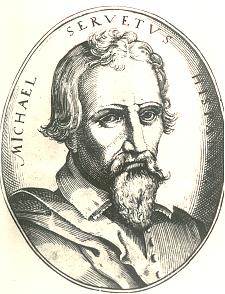Saturday, August 05, 2006
A Man for All Strife
 Miguel Servet Y Reves, otherwise known as Michael Servetus or Servet, is an interesting figure in the history of science. Born in Villanueva in north Spain, of noble parents in 1509 or 1511, he was a student of Andreas Vesalius, the great early anatomist of the Renaissance. Servetus, despite being more than a little mystical and wedded to speculative interpretation of Galen's system, still managed to give a clear description of pulmonary circulation.
Miguel Servet Y Reves, otherwise known as Michael Servetus or Servet, is an interesting figure in the history of science. Born in Villanueva in north Spain, of noble parents in 1509 or 1511, he was a student of Andreas Vesalius, the great early anatomist of the Renaissance. Servetus, despite being more than a little mystical and wedded to speculative interpretation of Galen's system, still managed to give a clear description of pulmonary circulation.Unfortunately, his influence on his contemporaries and subsequent generations of scientists was greatly muted because of his troubles with the religious authorities of his day. Even more important to him than science was his theological speculations. He made the mistake of holding views most notable for uniting all the then warring factions of Christians against him. An Arian who disapproved of infant baptism, he also lectured his students in Paris on astrology and the influence of the heavenly bodies upon health. This, rather predictably, caused trouble with the more orthodox theologians, requiring him to flee the city. Settling in Vienne on the Rhone, he authored another theological text and tried, with no success, to win the Protestant reformer, John Calvin, to his views.
As Erik Nordenskiöld put it in his book, The History of Biology (p. 110):
When, in spite of this, he dared to publish his book anonymously in Vienne and concluded it with a venomous attack on Calvin, the latter became furious and had the author brought before the Inquisition in Vienne. Servet was cast into prison, but managed to escape, and this time sought refuge in Geneva, probably in order to co-operate with the anti-CaIvinistic party which was just then planning an attack on the despotic reformer. Calvin, however, was on his guard; Servet was arrested and Calvin seized the opportunity offered by the trial of this sectarian, so hated by the whole Christian community, to strengthen his position. Having obtained the consent of several Protestant Church councils, the court at Geneva condemned Servet to be burnt at the stake, and the verdict was carried out on the 27th October 1553, to the eternal shame of Protestantism.But the really interesting thing was:
Shortly before, the Catholic Inquisition in Vienne had caused Servet's portrait to be burnt in the absence of Servet himself. Through his death, however, Servet won such renown as neither his personality nor his writings in themselves warranted; the Catholics in particular have in latter times honoured his memory, in order to annoy the Calvinists. Statues have been erected to him in both Paris and Madrid.
